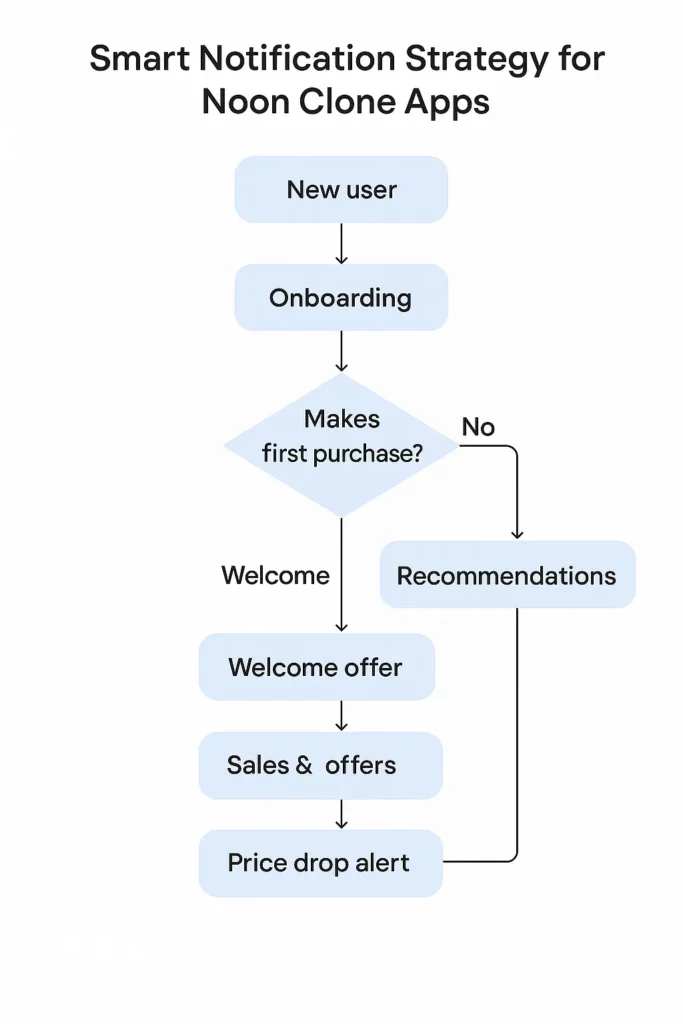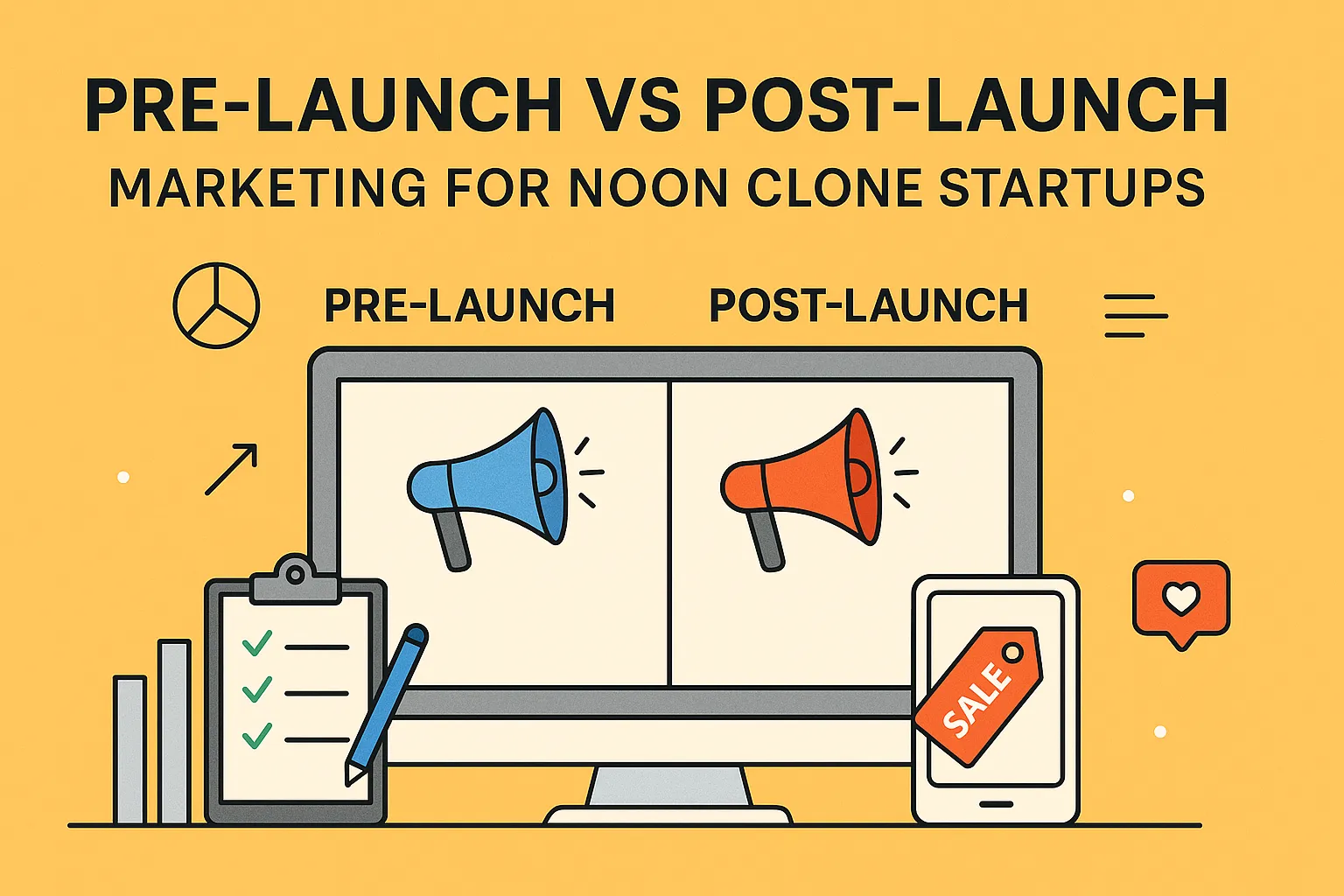So, you’ve built a stellar Noon clone, polished the UI till it gleams, and maybe even fantasized about waking up to a dashboard flooded with new users. But here’s the harsh truth: building the app is only half the battle. The rest? It’s all about marketing — before and after launch.
Many startup founders (especially first-timers) pour their soul into product development but treat marketing like a side quest. Some scramble at the last minute, hoping a few Google ads and an Instagram shoutout will do the trick. Others go live, wait for magic, and watch… nothing happen. Sound familiar?
The good news? You can flip the script with a killer marketing strategy that begins before your app sees the light of day and evolves as you grow. Whether you’re targeting the Middle East, Southeast Asia, or expanding into the global eCommerce space, Miracuves’ eCommerce app development services have helped entrepreneurs launch high-performance clones that didn’t just survive — they scaled.
What is Noon clone and How it Works?
A Noon clone is an eCommerce platform that replicates the core features of Noon.com, offering online shopping across categories like electronics, fashion, home goods, and groceries. It works by allowing vendors to list products, while customers browse, purchase, and make secure payments via web or mobile app. The system includes features like order tracking, reviews, real-time inventory, and multi-vendor support. Admins can manage products, users, and commissions from a central dashboard, making it ideal for launching region-specific online marketplaces.
Learn More: What Is a Noon Clone? Features, Benefits & How It Works

Pre-launch Marketing: Build the Hype Before You Even Launch
1. Create FOMO Like a Pro
Before your Noon alternative hits the app stores, your job is to spark curiosity. Why should people care? What problem are you solving that Amazon, Jumia, or even the original Noon isn’t?
- Start by crafting a story. People don’t buy apps — they buy solutions.
- Launch a simple landing page with a waitlist. Reward early signups with exclusive offers.
- Run a countdown timer to your launch. Scarcity triggers action.
2. Beta Test with Real Humans (Not Just Your Team)
There’s nothing like the cold splash of real feedback.
- Invite micro-influencers and niche bloggers for exclusive early access.
- Run invite-only betas and reward bug reports.
- Set up feedback loops via WhatsApp or Telegram communities.
This not only polishes your app but gives you content: testimonials, user quotes, even rants you can turn into features.
3. Start Collecting Emails Like a Squirrel Collects Nuts
Emails are the original goldmine. You own them, you control them — no algorithm drama.
- Use lead magnets: “Early Access + ₹500 Credits” or “Get Free Delivery for First Month”
- Run Facebook Lead Ads targeting online shopping enthusiasts
Pro Tip: Segment emails — beta testers, early birds, shoppers, resellers — so your messaging hits the mark.
Post-launch Marketing: Now the Real Show Begins
1. Push Notifications, Not People
Your users installed the app. Yay! Now what?
- Welcome them with a slick onboarding flow (don’t overload with tutorials)
- Use push notifications wisely — trigger-based ones work best (“Item you liked is now 20% off!”)
- Personalize messages based on past behavior
2. Performance Marketing: Spend Smarter, Not Just Bigger
- Run ads on Google, TikTok, and Facebook — but test like a maniac.
- Use carousel ads to showcase categories (electronics, groceries, fashion).
- Re-target cart abandoners and app installers who didn’t convert.
Stat to Chew On:
According to Statista, eCommerce ad spend in MENA is projected to grow 12.3% YoY from 2024 to 2027.
Statista eCommerce Marketing Forecast
3. Influencer & UGC Firepower
People trust people. Especially when it’s someone they follow every day.
- Partner with niche influencers (think regional creators, not just mega-stars)
- Run unboxing campaigns and incentivize user-generated content (UGC)
- Create a branded hashtag challenge: “#NoonCloneHaul” or “#CartVsReality”
The Strategic Shift: From Hype to Habit
One of the biggest mistakes startups make? Treating marketing like a launchpad, not a lifecycle.
Marketing Strategy to Build Noon Clone
Marketing a Noon clone requires a multi-channel strategy to build visibility, trust, and customer loyalty. Start with localized SEO and paid ads targeting keywords like “buy electronics online” or “fashion deals near me.” Launch with aggressive discounts, free shipping offers, and referral bonuses to attract early users. Leverage social media influencers and micro-creators to promote niche categories. Use email campaigns and push notifications for personalized offers and abandoned cart recovery. Invest in a robust affiliate program and partner with local sellers to expand product variety. Lastly, focus on mobile app marketing through ASO (App Store Optimization) and in-app promotions to boost retention and engagement.
Learn More: The Marketing Strategy Behind Noon – Clone Its Success
What Changes After Launch:
| Aspect | Pre-launch | Post-launch |
|---|---|---|
| Goal | Build awareness & interest | Drive installs & retention |
| Metrics | CTRs, sign-ups, email collection | DAUs, conversion rate, CAC, LTV |
| Audience Type | Early adopters & beta users | Mass market & power users |
| Channel Focus | Organic buzz, influencers, email | Paid ads, CRM, loyalty programs |
Localize to Monetize
Noon’s success in MENA wasn’t just about logistics or UI — it was cultural localization. Your clone app must speak the language, literally and metaphorically.
- Local language support, regional festivals-based promotions
- COD (Cash on Delivery) options — especially critical for trust in emerging markets
- Flash sales tied to regional holidays (Eid, Diwali, Singles Day)
Build Your Own E-commerce Marketplace App with Miracuves
Miracuves Tip: Don’t Just Launch an App, Launch a Brand
Yes, you’re cloning Noon — but the brand you build will be 100% yours.
- Design a visual identity: logos, color palette, app icon that pop on a smartphone screen
- Define your voice: witty, helpful, luxury — pick one and stick with it
- Have a point of view. Don’t just sell — stand for something (eco-shipping, local sellers, cashback economy, etc.)
| Category | Pre-launch Marketing | Post-launch Marketing |
|---|---|---|
| Primary Goal | Build anticipation, collect leads, generate early buzz | Drive installs, activate users, boost retention & revenue |
| Target Audience | Early adopters, curious testers, influencers, press | Mass market users, repeat customers, high-intent buyers |
| Key Activities | Email capture, teaser campaigns, influencer outreach, landing page optimization | App store optimization (ASO), performance ads, push notifications, loyalty programs |
| Content Strategy | Educational, behind-the-scenes, founder stories, sneak peeks | Product updates, reviews, user-generated content, sales promotions |
| Performance Metrics | Website traffic, email signups, social media followers, waitlist count | DAUs, MAUs, conversion rate, churn rate, LTV, CAC |
| User Engagement Tactics | Lead magnets, beta access, countdowns, referral rewards | Retargeting, promo codes, flash deals, CRM campaigns |
| Budget Allocation | Lean & organic — focus on earned media and micro-influencers | Heavier on paid acquisition, performance tracking, A/B testing |
| Tech Stack Involvement | Landing page builders (e.g., Carrd, Webflow), email tools (e.g., Mailchimp) | Analytics (e.g., Mixpanel), CRM (e.g., CleverTap), retargeting (e.g., Meta Ads) |
| Risks if Ignored | Cold launch, low installs, poor first impression | High uninstall rate, low engagement, poor ROI on development investment |
Conclusion
Pre-launch builds your runway. Post-launch gets the plane off the ground. And marketing? That’s your fuel — without it, even the most beautiful app won’t get far.
The smartest Noon clone founders don’t choose between pre and post. They do both — strategically, creatively, and relentlessly.
At Miracuves, we help innovators launch high-performance app clones that are fast, scalable, and monetization-ready. Ready to turn your idea into reality? Let’s build together.
FAQ’s
1) What’s the best time to start marketing my app?
Ideally, 2–3 months before launch. Think of it as a movie trailer — you need buzz before opening night.
2) Do I need a big budget for pre-launch marketing?
Not necessarily. Creativity beats cash. A solid email list and niche influencer collabs can work wonders.
3) How do I retain users after launch?
Retention = value + engagement. Push offers, personalize content, and reward loyalty consistently.
4) Should I launch with all features or go MVP?
Go MVP. Launch with your core USP, then roll out features based on user feedback.
5) How can I measure marketing success?
Track KPIs like CAC, LTV, DAUs, and conversion rates. Set weekly goals and iterate.
6) Can Miracuves help with marketing too?
Absolutely. While we specialize in clone app development, we also guide you through launch, scaling, and GTM strategies.








